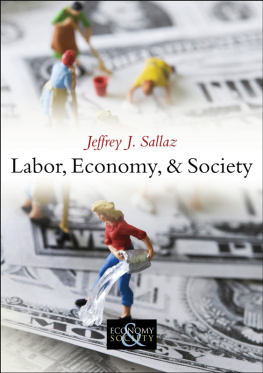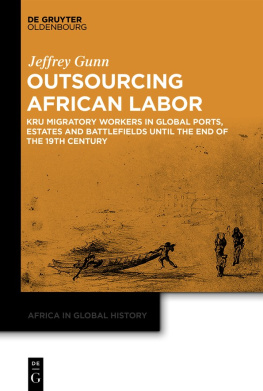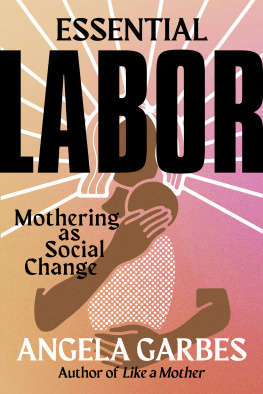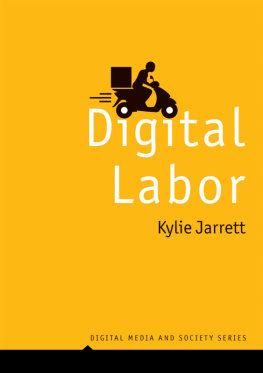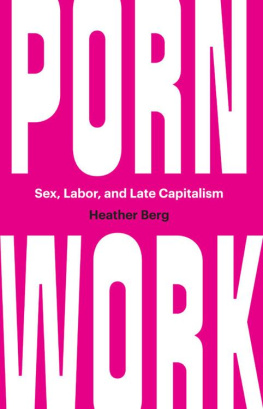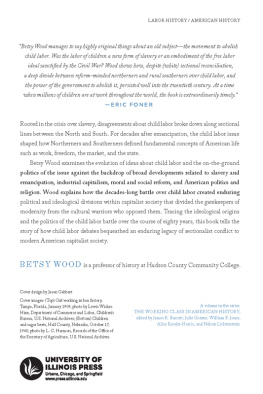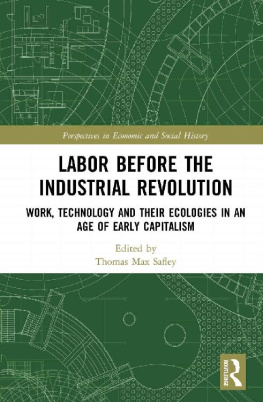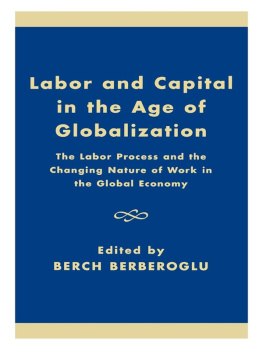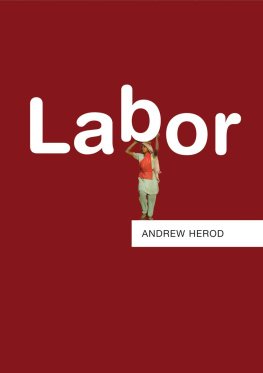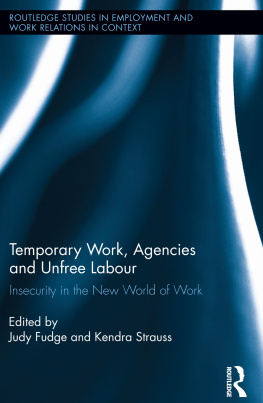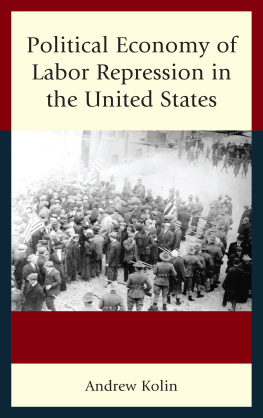Labor, Economy, and Society
Economy and Society
Markets, Patrik Aspers
Economy and State, Nina Bandelj and Elizabeth Sowers
Money and Credit, Bruce G. Carruthers and Laura Ariovich
Global Capitalism, Miguel A. Centeno and Joseph Nathan Cohen
Institutions and the Economy, Francesco Duina
Economic Networks, David Knoke
Labor, Economy, and Society, Jeffrey J. Sallaz
Labor, Economy, and Society
Jeffrey J. Sallaz
polity
Copyright Jeffrey J. Sallaz 2013
The right of Jeffrey J. Sallaz to be identified as Author of this Work has been asserted in accordance with the UK Copyright, Designs and Patents Act 1988.
First published in 2013 by Polity Press
Polity Press
65 Bridge Street
Cambridge CB2 1UR, UK
Polity Press
350 Main Street
Malden, MA 02148, USA
All rights reserved. Except for the quotation of short passages for the purpose of criticism and review, no part of this publication may be reproduced, stored in a retrieval system, or transmitted, in any form or by any means, electronic, mechanical, photocopying, recording or otherwise, without the prior permission of the publisher.
ISBN: 978-0-7456-6516-0
A catalogue record for this book is available from the British Library.
The publisher has used its best endeavours to ensure that the URLs for external websites referred to in this book are correct and active at the time of going to press. However, the publisher has no responsibility for the websites and can make no guarantee that a site will remain live or that the content is or will remain appropriate.
Every effort has been made to trace all copyright holders, but if any have been inadvertently overlooked the publisher will be pleased to include any necessary credits in any subsequent reprint or edition.
For further information on Polity, visit our website: www.politybooks.com
List of Figures
| US unemployment rate, 19902011 |
| Productivity growth versus real median family income growth in the United States since 1947 |
| Institutional and individual boundaries of employment |
| Unemployment rates in 1995, 2000, and 2005 for select OECD countries |
| Unionization rate in OECD countries, 19602008 |
| Union decline across select OECD countries, 19602008 |

Introduction:
What Good is Work?
[I]f the concept of labor which in its hitherto accepted generality has given a vague feeling rather than a definite content to its meaning is to acquire such a definite meaning, then it requires that a greater precision be given to the real process which one understands as labor. (Simmel 2011 [1907]: 453)
It often seems as though capitalist societies exist in a state of perpetual crisis regarding the issue of work. Consider the United States, long home to the worlds largest economy and where, in 2008, a financial crisis originating in the housing sector triggered a severe and extended economic slow-down. As the Great Recession entrenched itself, indebted consumers cut back on spending while businesses and governments scaled back hiring and laid off employees. By 2011 the country as a whole was 12 million jobs short of the number needed to provide employment for all eligible adults not to mention the additional 25 million people working part-time but desiring full-time work.
The nations mood was dark, to say the least. Night after night, news programs featured heartbreaking stories of hopeless job-seekers queuing up at employment agencies. Politicians from both sides of the aisle hammered Democratic President Barack Obama for his lack of a comprehensive jobs plan to address an unemployment rate hovering around 10 percent. While many offered different remedies for what ailed the economy, the underlying diagnosis was widely agreed upon: industrious Americans were desperately seeking work, but the jobs were simply not there.
In the midst of such a crisis, it was only too easy to forget that scarcely a decade before in fact, during the previous Democratic presidential administration the United States faced the opposite problem. During the 1990s, driven by a dot-com investment boom, stock markets increased in value, consumers went on a spending binge, and firms went on a hiring spree. With the unemployment rate dropping under 4 percent and a surplus of job openings, the American economy was plagued not by a lack of jobs but by a lack of workers! Especially for employers in the low-wage sectors of the economy (such as food service and home health care), it was difficult to attract staff at the prevailing minimum wage. The dominant discourse on employment shifted as well, and it soon became bipartisan common sense that the problem haunting America was an eroding work ethic.
The system of entitlements that had been put in place over the preceding decades to protect vulnerable Americans, this thinking went, had backfired. An overly generous welfare state had created a coddled and indolent class of job-shirkers (Collins and Mayer 2010). In truth, even at its peak, the welfare system in the Unites States was less generous than that of other rich industrialized nations (Esping-Andersen 1990; Steensland 2007). Nonetheless, President Clinton, in 1996, signed the Personal Responsibility and Work Opportunity Act, a piece of legislation intended to end welfare as we know it (Clinton 2006). It forced recipients of public assistance to sing for their proverbial suppers, no matter how menial the employment they acquired.
A seemingly permanent crisis of work is not unique to the United States. For some time now, Europe has been plagued by high unemployment and economic stagnation, a situation many attribute to inflexible labor markets. Burdensome state regulations and powerful labor unions, critics argue, have made it difficult for firms to hire and fire workers in response to fast-shifting business conditions.
Meanwhile, in China, decades of economic reform have liberalized the economy and produced staggering economic growth. In fact, in early 2011, China surpassed Japan to become the worlds second largest economy. Accompanying this rise in output, however, has been a surge in protests and strikes by workers in the countrys burgeoning factory system (Lee 2007). As they produce more and more goods for the worlds (and especially Americas) consumers, Chinese workers appear to be increasingly unsatisfied with their poor working conditions and lack of socio-economic mobility. Similar stories of labor discontent can be found in the worlds other emerging economies, such as Brazil, South Korea, South Africa, and India (Silver 2003).
The purpose of this book is to mobilize the conceptual tools of economic sociology to understand the place and fate of work under global capitalism. Economic sociology is ideally suited to this task. As an academic field it endeavors to put capitalism in world-historical perspective, as but one among many potential ways to organize economic activity. How, it asks, did private property and labor markets come to constitute the pillars of the modern global order? Why is the contemporary world converging upon an extreme version of capitalism (the free-market, or neoliberal, version most closely associated with the United States)? Is it folly to even imagine a post-capitalist future?
To address such questions, economic sociologists have assembled a range of theories, ideas, and methods. At the center of and unifying this assemblage is one key insight: that markets are social structures (Martin 2009). They come into being not as the expression of some natural law, but as strategic action projects that achieve success at particular historical moments (Fligstein and McAdam 2012; Hall and Soskice 2001). Markets of labor are no exception. To transform the basic human capacity to engage in meaningful work into a commodity requires persuasion, coercion, and ongoing intervention. To challenge the resulting fiction requires strategic action as well. As the paradigm of regulated capitalism (in which labor is afforded basic protections from the constant pressure of the market) gives way to unfettered market fundamentalism, it becomes ever more important to understand how these conflicts over labors status as a commodity play out.
Next page
